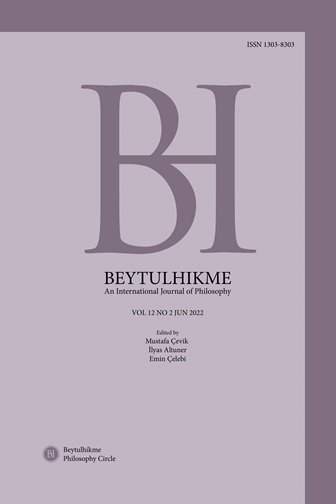Author :
Abstract
Abdüksiyon ve en iyi açıklamaya çıkarım terimleri sıklıkla aynı akıl yürütme türü olarak ifade edilir. Fakat, yakın zamanlarda bunun bir hata olduğu iddia edilmektedir. Peirce’ün ileri sürdüğü abdüktif çıkarım beklenmeyen gözlemler karşısında yeni bir fikir üretmekle ilgiliyken, en iyi açıklamaya çıkarım ise hangi hipotezin en makul olduğunu belirlemekle ilgilidir. Bu çalışmada, iki çıkarım türü arasındaki fark epistemik rasyonalite üzerinden gösterilecektir. Epistemik rasyonalite bakımından, delil ve inanç arasında güçlü bir ilişki gereklidir. Bu açıdan incelendiğinde, abdüktif çıkarımın delilsel desteği zayıftır, ama bu sayede delillerinin ötesine genişleyerek hipotez yaratma olanağına sahip olmaktadır. En iyi açıklamaya çıkarım ise güçlü bir delilsel desteğe sahip olmadan meşrulaştırılamaz.
Keywords
Abstract
The terms abduction and inference to the best explanation are often referred to as the same type of reasoning. However, it has recently been claimed that this was a mistake. While the abductive inference proposed by Peirce is about generating a new idea in the face of unexpected observations, inference to the best explanation is about determining which hypothesis is the most plausible. In this study, the difference between the two types of inference will be shown through epistemic rationality. In terms of epistemic rationality, a strong relationship between evidence and belief is necessary. From this point of view, the evidential support of abductive inference is weak, but it thus has the opportunity to expand beyond its evidence and create hypotheses. Inference to the best explanation, cannot be justified without strong evidential support.
Keywords
- Bergmann, M., Moor, J., & Nelson, J. (2009). The Logic Book. McGraw-Hill.
- Brem, S. K., & Rips, L. J. (2000). Explanation and evidence in informal argument. Cognitive science, 24(4), 573-604.
- Campos, D. G. (2011). On the distinction between Peirce’s abduction and Lipton’s inference to the best explanation. Synthese, 180(3), 419-442.
- Christensen, D. (2011). Disagreement, Question-Begging and Epistemic Self-Criticism. 11(6), 1-22.
- Erdenk, E. A. (2015). Two tokens of the inference to the best explanation: No- miracle argument and the selectionist explanation. Beytulhikme An International Journal of Philosophy, 5(1), 31-46.
- Feldman, R. (2005). Respecting the evidence. Philosophical Perspectives, 19, 95-119.
- Feldman, R. (2007). Reasonable Religious Disagreements. İçinde L. M. Antony (Ed.), Philosophers without Gods (ss. 194-214). Oxford University Press.
- Feldman, R., & Conee, E. (1985). Evidentialism. Philosophical Studies: An Internatio- nal Journal for Philosophy in the Analytic Tradition, 48(1), 15-34.
- Frankfurt, H. G. (1958). Peirce’s notion of abduction. The Journal of Philosophy, 55(14), 593-597.
- Hanson, N. R. (1960). Is there a logic of scientific discovery? Australasian Journal of Philosophy, 38(2), 91-106.
- Harman, G. H. (1965). The inference to the best explanation. The philosophical re- view, 74(1), 88-95.
- Kelly, T. (2003). Epistemic rationality as instrumental rationality: A critique. Phi- losophy and Phenomenological Research, 66(3), 612-640.
- Koehler, D. J. (1991). Explanation, imagination, and confidence in judgment. Psyc- hological bulletin, 110(3), 499-519.
- Lipton, P. (2004). Inference to the Best Explanation. Routledge.
- Littlejohn, C. (2018). Stop making sense? On a puzzle about rationality. Philosophy and Phenomenological Research, 96(2), 257-272.
- Magnani, L. (2009). Creative Abduction and Hypothesis Withdrawal. İçinde J. Matheus & T. Nickles (Ed.), Models of Discovery and Creativity (ss. 95-126). Springer.
- McAuliffe, W. H. (2015). How did abduction get confused with inference to the best explanation? Transactions of the Charles S. Peirce Society: A Quarterly Journal in American Philosophy, 51(3), 300-319.
- Peirce, C. S. (1955). Philosophical Wiritings of Peirce (J. Buchler, Ed.). Dover Publica- tions.
- Peirce, C. S. (1986). Writings of Charles S. Peirce: A Chronological Edition (the Peirce Edition Project, Ed.; C. 3). Indiana University Press.
- Peirce, C. S. (1989). Writing of Charles S. Peirce: A Chronological Edition (the Peirce Edition Project, Ed.; C. 4). Indiana University Press.
- Peirce, C. S. (1998). The Essential Peirce: Selected Philosophical Writings (the Peirce
- Plutynski, A. (2011). Four problems of abduction: A brief history. HOPOS: The Jo- urnal of the International Society for the History of Philosophy of Science, 1(2), 227248.
- Schupbach, J. N. (2017). Inference to the Best Explanation, Cleaned Up and Made Respectable. İçinde K. McCain & T. Boston (Ed.), Best Explanations: New Essays on Inference to the Best Explanation (ss. 39-61). Oxford University Press.
- Thagard, P. R. (1977). The unity of Peirce’s theory of hypothesis. Transactions of the Charles S. Peirce Society, 13(2), 112-121.
- Thagard, P. R. (1978). The best explanation: Criteria for theory choice. The journal of philosophy, 75(2), 76-92.
- Van Fraassen, B. C. (1989). Laws and Symmetry. Oxford University Press.
- Weintraub, R. (2013). Induction and inference to the best explanation. Philosophical Studies, 166(1), 203-216.





